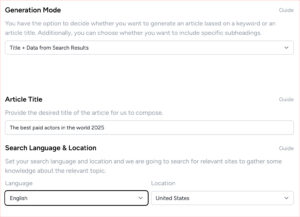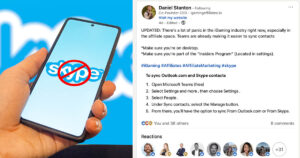Who doesn’t want their website to be the top place people go to on Google? We’ve had that dream, and I bet you have too, which is likely why you’re reading this. The fancier way to say this is “Topical Authority.” Today, I’ll tell you how you can boost your rankings and make your organic traffic better.
Before we get started, let’s talk a little bit about what Topical Authority actually means. “Experts” throw this term around promising it has potential to improve your organic rankings, but you may have absolutely no idea what this actually means. Or even how to do this.
So, let me put it simply. “Authority” means how much a piece of information on the internet is powerful or important compared to other information. In SEO, if google sees your webpage as really important, it’s more likely to show up higher in regular search results. And who doesn’t want to take that top spot?
An example of this is; if you searched for “how to buy the best Tennis racket”, you’d likely find a top result like Wilson’s Sporting Goods. They are recognized as a reliable source of tennis knowledge, and a huge brand within the industry which is why Google ranks them at the top.
SUMMARY: Google will push you to the top if you publish top quality content. It needs to scream Authoritative and that it’s a trustworthy source of information. We covered this in detail in our article E-E-A-T And what to add to your Sports Website in order to help the Google Bots giving you a High E-E-A-T Score
Google actually measures Topical Authority. So can you.
The more high quality and informative content you publish, the more trust you will earn and be seen as an expert in your area. For example, we have been in SEO and Internet Marketing for over 15 years; you can see our CEO and Founder’s profile and hopefully you will see that we have experience in this area and that we’re “qualified” to share information with you that you can trust. BUT, if you saw that this topic was written by a Mechanic (nothing against Mechanics, the world would be a very difficult place without them) then you would start to question the validity of this information.
If you are a brand new company, this can be quite a challenge for you. You are still building your credibility in the industry and therefore it’s even more important to show Google the experience you have in the field and release informative content. You need to show your audience that you definitely know what you are talking about and that they can trust you.
This takes time but it pays off. If a new shop opens up with sports apparel, and you have always been loyal to the Nike giants, then you might not be willing to purchase anything from there. But if your friend shows up for your tennis match in very cool shoes and raves about how much better they are than their old ones (and actually beats you in the game), and then tells you where they bought it from, then you might be more likely to check the shop out.
Summary: You can measure your Topical Authority by the amount of top content you are publishing on your website and how many visitors are coming back to your page to keep reading your information.
So when did this all start?
Topical Authority came into play with Google’s Hummingbird algorithm back in 2013. Google completely transformed how they analysed content. They created an even better strategy to help users who were searching for things from their mobiles. Before Hummingbird, Google’s algorithm was focused only on keywords. Hummingbird changed the game and it was now based on the relevance to the user’s query.
Fun fact: Google named it hummingbird based on the speed and accuracy of a hummingbird. These birds are super agile and have unique flying abilities!
Back to the good stuff. Basically, what Google does is, it takes the conversational inputs that users were searching in Google and then starts to rank websites according to what the users were inputting. This was a much better experience for us – the people looking for stuff in google!
Previously Google also relied on inbound links (amongst other things) to determine how high a page should rank. With Topical Authority, the requirement for actual value adding content increased significantly. Having links was no longer enough.
“I want free traffic”. “Well, so do I!”
You can have it! You simply need to prove to Google and the search users that you have authority over a subject and that you deserve FREE traffic. By building topical authority in your niche, you can achieve this.
Example: Let’s imagine you have a website all about sports. You create a lot of detailed content about one specific area, like basketball. You talk about everything, from hoops to balls, shoes, and clothes for basketball. This makes search engines think your website really knows a lot about basketball, and you become an expert in that area.
Additional benefits from doing Topical Authority
Ok, of course, let’s not sugar coat this. The main aim of doing all of this is because we want free organic traffic. Who doesn’t want that?? But there are some more advantages too.
You need less Backlinks
Once you establish topical authority, you don’t really need backlinks as much. Backlinks can be pretty expensive so saving money on this is definitely a positive.
Bigger Brands actually don’t do this
It goes without saying that Enterprise websites have a lot of resources you and I will never have access to.
They are able to heavily invest in:
- Backlinks (mentioned above)
- Expert writers
- On-page SEO
- Constantly updating their content (that can be a full time job on its own!)
(Un)Surprisingly, because they are so big, they tend to cover a lot of things broadly as opposed to zoning in one niche. And that’s the advantage we both can have over them. If you cover your topic in a lot more detail, you can outrank those big boys for a specific keyword.
SUMMARY: Invest more in content rather than backlinks. You can actually be ahead of your competitors and big Enterprise companies by zoning in on your niche topic and showing google and readers that you are an expert in your field, hence creating Authority.
Don’t do this:
We have been talking about really focusing on one niche so that you create Topical Authority and you are seen as an expert in that particular field.
Don’t make the mistake of introducing a completely random and different topic into the mix.
Example: if you are reading the latest news on the premier league, and all of a sudden, the author has another post about motorbikes, wouldn’t you be a bit confused as to why and how that happened? I mean, what do motorbikes have to do with the Premier League? Immediately, the trust barrier is broken.
Stay within your scope. Do not cause confusion.
How to Put Topical Authority Keyword Research into Action
So, let’s get stuck into the “how-to” details a bit more. I know I have been saying that you need to create quality content, but before you grab your pen and paper (ok no one does that anymore) you still need to identify relevant topics. So how do you do that?
Discover Entities and Investigate Knowledge Panels
Ok, that was a mouthful! First of all, if you’re not sure what Entities are, it’s just basically what Google determines as a topic. Every Entity has what is called a parent/child relationship. Which is another way of saying that there is hierarchy between topics and subtopics. So Digital Marketing is a Topic. Keyword research is a subtopic. And Google knows there is a relationship within the hierarchy. By creating a map of Entitles, you can visualise and identify sub topics to create content about.
For example, let’s say you have a Sports Website that publishes Formula 1 News. Of course, your readers are definitely going to want to read (or watch video content) about the Race Results and Analysis. But there are so many other topics to include, such as:
- Driver Profiles
- Team Updates and Strategies
- Upcoming Races and Previews
- Driver Transfers and Contract News
- Technical Insights and Innovations
- Regulation Changes and Rule Updates
- Behind-the-Scenes Stories
- Historical Moments and Flashbacks
- Driver Interviews and Quotes
- Fan Engagement and Opinions
- Race Circuit Spotlights
- Race Strategy Breakdown
Anyway, you get the drift! Your goal should be to cover as many subtopics under the “parent Topic” or “Entity” as possible (within reason of course).
Let’s move on to Knowledge Panels. Google does a great job of explaining what they are. But hopefully I’ve proven myself so far that I know a thing or two about this topic, so I will explain it quickly:
Knowledge panels are boxes of information that show up on Google when you search for things like people, places, or organisations. They give you a quick summary of information about that topic, using what Google knows from the internet.
Example; Let’s say you are in the Sports News industry. If you google Sports News Companies, the results will show a number of well known sports news sites and you might want to include them in your content creation.
But not just that, you also get suggested topics that you might want to write about, such as:
And, you can also click on images, you might see some other brands or products you could also include. Of course, you might get some weird suggested images so feel free to ignore those!
Also, you will get suggested Related Searches – which are other keywords that people are typing in google and searching for.
You can also use keyword suggestion tools out there that essentially scrape Google for suggestions at the bottom of a SERP. Don’t skip this action. Keyword research strategy is important in content marketing.
Look at your Competitor’s data
There are many tools out there that you can use to analyse the data of your competitors. When putting together your list of competitors, make sure that you select domains that get lots of traffic and have a lower DR. Don’t hold back. Make your list as long as possible.
You will want to check the main pages of each website and find patterns and words that make sense for you to include.
Here is a trick of the trade for you: when you don’t fill in your own website’s info, you can see the keywords your competitors rank for without your own site affecting the results.
Once you’ve done that you can choose the keywords you think are important for all your competitors. Look for similarities and figure out which keywords they all rank for.
Now I know, this sounds a bit too complicated and time consuming. And to be honest, it does require time. And having someone with some experience and knowledge in this area is going to be helpful. However, if you have the patience, you can do this and you will get better and quicker with time. Alternatively, you can also seek out the help of a content company that can literally do all of this for you and to be honest, they are normally quite reasonably priced. You can discover the content plans at Topcontent to see if this helps you out.
The digital age of AI – use it to your advantage
The robots are here to stay – so let’s use the best bits of them! Let’s say I wanted to get some more topics for a Football site I am going to launch. I can ask ChatGPT and see what advice it gives me:
Now, keep in mind that AI is not necessarily looking at what is being searched in Google, so you still need to do the research we spoke about further up. However, there could be some good ideas that you could include as subtopics.
SUMMARY: Create a content plan. Have a strategy. Understand what sub topics you should focus on. Use tools such as Knowledge Panels and AI. Analyse your Competitor’s data. And find reputable companies to help create the content plan you need.
Final takeaways; Slow and Steady wins the race
Establishing Topical Authority will not happen overnight. It takes patience, (some) money and consistency. A sad reality is that many companies give up on believing that they can improve their organic rankings and are unwilling to invest the time and effort. And I won’t lie, a lot of time and effort is needed.
But slow and steady wins the race! This is one you can win over time!
In this article we have covered all the tools you need to establish Topical Authority. Don’t underestimate the fact that your competitors are “not on top of everything” and with some research and content planning, you can have the advantage.
If you need help with publishing high quality content that will capture your readers attention and demonstrate that you have Authority in the sports industry, feel free to contact Attentionflow.ai. We can offer a free sample and help you understand how you can publish authoritative content, automatically, at scale and that will help you improve your Topical Authority.





